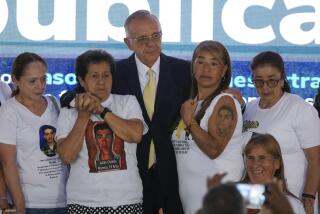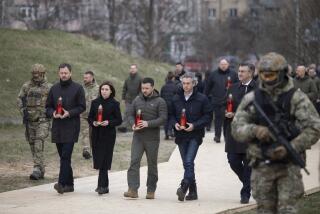Brazil’s military to cooperate in dirty war investigation
SAO PAULO, Brazil — Brazil’s military has agreed to open investigations of use torture at bases it operated during two decades of dictatorship from 1964 to 1985.
The announcement Tuesday, the 50th anniversary of the coup that toppled a democratically elected government, marked the first time the country’s armed forces have pledged to cooperate in examining human rights crimes for which no one has ever been tried. An amnesty law was passed by the military government in 1979.
The military government is accused of killing and “disappearing” more than 450 people and torturing and exiling thousands. The military on Tuesday finally accepted a request from the country’s Truth Commission, a public, non-military organ investigating abuses in the period, five decades after the day President Joao Goulart was deposed.
The anniversary of the coup has been marked by a bout of national reflection in Latin America’s largest country, as well as with protests over allegations of ongoing brutality by military police.
“We must remember and tell the story of what happened,” President Dilma Rousseff, a former anti-dictatorship guerrilla who was imprisoned and tortured, said Monday.
“We owe this to everyone who died and disappeared, to those tortured and persecuted, to their families, to all Brazilians,” she said. “If there are children without parents, parents without tombs, there can never, never, be a story without a voice. And the voice in that story is provided by the free men and women who are unafraid to write it.”
From March 31 to April 4, 1964, conservative political forces and the military forced progressive President Goulart into exile and established the first of many U.S.-allied military dictatorships in South America.
Powerful right-wing forces considered Goulart’s left-leaning reform program dangerous, especially in the context of the Cold War. Declassified documents show that Washington offered explicit military support to the coup, if needed.
Initially considered a temporary solution and backed by significant parts of Brazilian society, including the media, the coup saw military rulers maintain power, eventually making liberal use of torture, repression and censorship.
Brazil’s Truth Commission was formed in late 2011, long after neighbors Chile, Argentina, and Uruguay went through similar bouts of self-reflection.
The commission can publish accounts of crimes committed but has no power to prosecute the guilty because of the amnesty law, which Rousseff says she supports.
Military participation in the investigation will begin with the formation of commissions to study seven installations believed to have been used for crimes, according to a note published Tuesday on the commission’s website.
“This is a very important gesture from the armed forces,” Pedro Dallari, Truth Commission coordinator, said. “It’s a big step forward.”
The military high command has never acknowledged any responsibility for crimes committed during the dictatorship, which ended in 1985.
Bevins is a special correspondent.
More to Read
Sign up for Essential California
The most important California stories and recommendations in your inbox every morning.
You may occasionally receive promotional content from the Los Angeles Times.










